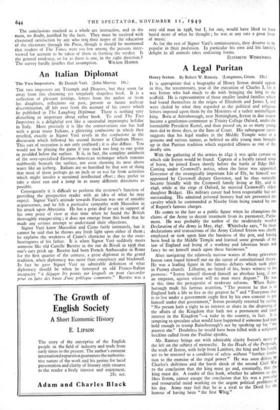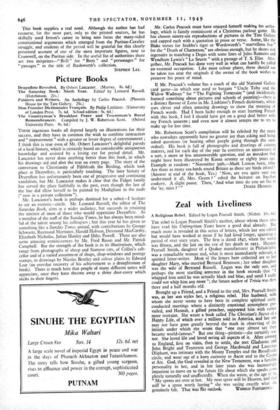A Legal Puritan
Henry Ireton. By Robert W. Ramsey. (Longmans, Green. 15s.)
IT is appropriate that a biography of Henry Ireton should appear in this, the tercentenary, year of the execution of Charles I, for it was Ireton who had much to do with bringing the king to the scaffold. He is representative of those smaller landed families which had found themselves in the reigns of Elizabeth and James I, and were chafed by what they regarded as the political and religious fetters imposed upon them by the Ministers of a rather unintelligent king. Born at Attenborough, near Nottingham, Ireton in due course became a gentleman-commoner at Trinity College Oxford, under the formidable President Kettel, and then passed on, as so many young men did in those days, to the Inns of Court. His subsequent career suggests that his legal studies in the Middle Temple were of a genuine and serious nature, as befitted an able young man brought up in that Puritan tradition which regarded idleness as one of the deadly sins.
With the gathering of the armies in 1642 it was quite certain on which side Ireton would be found. Captain of a locally raised troop of horse, he joined Essex shortly before the battle of Edge Hill. Coming under Cromwell's notice, when the latter was appointed Governor of the strategically important Isle of Ely, he himself was appointed by Cromwell deputy Governor, and he thus naturally became friendly with the Cromwell family living at Ely, and in 1646, while at the siege of Oxford, he married Cromwell's eldest daughter Bridget. His military career had been respectable but not outstanding. His admitted personal bravery had not prevented the cavalry which he commanded at Naseby from being routed by one of Rupert's famous charges.
He comes to the fore as a public figure when he champions the claims of the Army to decent treatment from its paymaster, Parlia- ment. He was probably the author of the moderately wordcd Declaration of the Army in May, 1647. Whitelocke says, " In these declarations and transactions of the Army Colonel Ireton was chiefly employed or took upon him the business of the pen, and having been bred in the Middle Temple and learned some grounds of the law of England and being of a working and laborious brain and fancy he set himself much upon these businesses."
After navigating the relatively narrow waters of Army grievances Ireton soon found himself out on the ocean of constitutional theory. He was a leading figure in the famous debates which took place in Putney church. Lilburne, no friend of his, bears witness to hit prowess: " Ireton himself showed himself an absolute king, if not an emperor, against whose Will no man must dispute." He was at this time the protagonist of moderate reforms. When Rains- borough made his famous assertion, "The poorest he that is in England hath a life to live as the greatest he " and " Everyman that is to live under a government ought first by his own consent to put himself under that government," Ireton promptly retorted by saying, "No person hath a right to an interest or share in the disposing of the affairs of the Kingdom that hath not a permanent and fired interest in the Kingdom "—a stake in the country, in fact. It is tempting to speculate what would have happened if someone had been bold enough to trump Rainsborough's ace by speaking up for "the poorest she." Doubtless he would have been felled with a scriptural brickbat culled from the Pauline epistles.
Mr. Ramsey brings out with admirable clarity Ireton's move to the left on the subject of monarchy. In the Heads of the Proposals, the work of Ireton, with help from Lambert, the king and his Ctnili are to be restored to a condition of safety without " further limita- tion to the exercise of the regal power." He was soon driven by Charles's shiftiness and the harsh shock of the second Civil War to the conclusion that the king must go and, eventually, that the king must die. A reader of this book, whether he admires or du likes Ireton, cannot escape the conclusion that his was a powerful and resourceful mind working on the urgent political problems of his day. Some may feel that he is a rival to the Devil for the honour of having been " the first Whig."
This book supplies a real need. Although the author has had recourse, for the most part, only to the printcd sources, he has skilfully used Ireton's career to bring into Locus the many-sided constitutional arguments which emerged from the Puritan-Cavalier struggle, and students of the period will be grateful for this clearly presented account of one of the most important figures, next to Cromwell, on the Puritan side. In the useful list of authorities there are two misprints—" Brill " for " Brett " and " personages " for " passages " in the title of Rushworth's collection.
STEPHEN LEE.



































 Previous page
Previous page